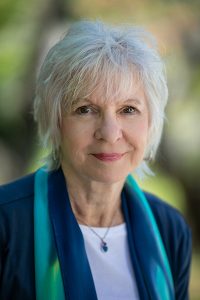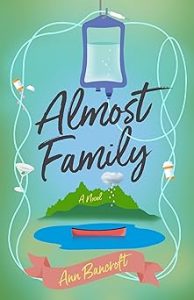Cancer Helped Me Finish My Novel, Almost Family
Cancer Helped Me Finish My Novel, Almost Family
A cancer diagnosis has a way of concentrating the mind and muddling it at the same time. As the shock of mortality sinks in, all the nebulous thoughts about what you might want to do someday narrow to a few simple imperatives: spend time with those you love, wring every drop out of every hour of every day, stay alive.
My first bout with breast cancer at age 56 left me with pretty good survival odds, though I still went to the worst place in my mind. Because the tumor was aggressive, it required two surgeries, three months of chemotherapy and seven weeks of daily radiation treatments. It laid me flat. I couldn’t focus on reading anything longer than a few paragraphs. Stacks of unread books taunted me from my bedside. Yet as I struggled through treatments, I kept vaguely imagining a future in which I’d write fiction. After a career of writing “just the facts” news stories, then speeches and articles for other people, I wanted to write in my own voice.
But I wondered, would I ever again be able to read an entire novel, let alone write one?
After returning to my full-time job, I knew that despite wonderful colleagues, a good salary and great boss, I needed to do something more creative. I felt I had no time to waste, so I retired early, signed up for fiction writing classes, and began trying my hand at short stories. The last thing I wanted to write about was cancer. But with my journey from diagnosis through grueling treatment still so vivid, the experience such an integral part of me, the subject was impossible to avoid. I needed to write about it.
I assumed few readers would be interested in reading another cancer survivor memoir. But a germ of an idea kept popping up. It began with, “What if?” What if, instead of having had loving support from family and friends, I had been alone in life, estranged from people I love? What if my worst heartbreak had occurred in the middle of treatment? And then, what if my cancer recurred as metastatic? How would I cope and what would I do with my time? How would I react to the world, and how would it react to me? It’s one thing to feel yourself aging in the eyes of others, and another to have others look at you and go straight to thoughts of death.
Over the next several years — during which I mentored breast cancer patients, wrote essays and began seriously studying the craft of writing fiction. I developed characters who meet in a support group for metastatic cancer patients. The protagonist, Liz, is a snarky, tightly wound, emotionally isolated woman who gets diagnosed with recurrent, stage 4 cancer at an already low point in her life. She thinks of herself as a person who wouldn’t be caught dead going to a support group, but once she comes to grips with the fact she actually is going to die, decides, “What the hell. What’s to lose?” and attends a hospital-sponsored group.
It meets in a comically awful setting – a department store employee training room, where green tea and flax bars are provided as snacks. Liz immediately gauges the facilitator to be unbearably incompetent, and her instinct is to flee, but she uncharacteristically connects to two other middle-aged, stage 4 patients, a man and a woman she would have met under no circumstances but these. The three decide to ditch the group and form their own, one devoted to making the most of their days: outdoor excursions, field trips, live music. During these get-togethers, secrets spill out and they forge a bond of platonic love, helping one another heal family rifts, and finding a sense of acceptance and peace. I wrote draft after draft, and called the novel, Almost Family.
Rather than write specifically about cancer, I wanted to write a story about the fullness of life toward its end. I wanted to make it easier for people to see that cancer patients, even those pronounced terminally ill, still have the potential to grow. I wanted to make clear that as long as we live, we can learn to love more fully and be more present in our lives. And, I wanted to show that even the toughest of times can be funny — we can hold poignancy and humor at the same time, without getting all melodramatic about it.
The saga of getting this novel to publication is a story unto itself. It was nearly published, rejected, revised, awarded, rejected, put on the shelf, revised some more and finally accepted by She Writes Press, a wonderful hybrid publisher where women writers support each other, working through doubts and insecurities, stretching our comfort zones, and, eventually, proudly. holding copies of our finished books. I persisted in this journey because, like Liz, I felt as if I had nothing to lose and no time to waste.
My cancer returned before this publication journey began, but after the second diagnosis, I felt oddly less frightened. I’d survived once; I knew the ropes. During my year of surgeries and chemotherapy, I worked on revisions, exercised as a way of mitigating side-effects, and talked with other patients about creative ways of getting through. I no longer worry about the worst case; I now know now deep in my bones we all are mortal. Instead, I’m grateful to be alive, and thrilled to be publishing a debut novel at the age of 71.
I can’t say I’m grateful for cancer, but experiencing it gave me the courage and incentive to finish a novel at last, one that, as author Jodi Angel said, is “about love and the power of friendships to heal what the doctors can’t.”
—
 Ann Bancroft began writing fiction after a career in journalism and communications. Her first job after graduating from UC Berkeley was as “copy boy” at The Oakland Tribune, at a time when there were few women in the newsroom. As a reporter, she worked in the State Capitol bureaus of the San Francisco Chronicle, United Press International and the Associated Press. She wrote editorials for The Sacramento Bee and was later appointed communications director for the State Department of Education. After a first bout of breast cancer, she retired early and began writing fiction, leading generative writing workshops, and mentoring breast cancer patients. She’s an alumna of the Community of Writers, the Tomales Bay Writers Workshops, and Everwood Farmstead artist’s residency. “Almost Family” is her debut novel, to be published when she is 71. Ann and her husband are avid travelers and hikers, and when not writing, she loves to cook and entertain. They live in Sacramento and Coronado, California. Find out more about her at her website.
Ann Bancroft began writing fiction after a career in journalism and communications. Her first job after graduating from UC Berkeley was as “copy boy” at The Oakland Tribune, at a time when there were few women in the newsroom. As a reporter, she worked in the State Capitol bureaus of the San Francisco Chronicle, United Press International and the Associated Press. She wrote editorials for The Sacramento Bee and was later appointed communications director for the State Department of Education. After a first bout of breast cancer, she retired early and began writing fiction, leading generative writing workshops, and mentoring breast cancer patients. She’s an alumna of the Community of Writers, the Tomales Bay Writers Workshops, and Everwood Farmstead artist’s residency. “Almost Family” is her debut novel, to be published when she is 71. Ann and her husband are avid travelers and hikers, and when not writing, she loves to cook and entertain. They live in Sacramento and Coronado, California. Find out more about her at her website.
ALMOST FAMILY
 Liz Millanova has stage four cancer, a grown daughter who doesn’t speak to her, and obsessive memories of a relationship that tore apart her marriage. She thinks of herself as someone who’d rather die than sit through a support group, but now that she actually is going to die, she figures she might as well give it a go.
Liz Millanova has stage four cancer, a grown daughter who doesn’t speak to her, and obsessive memories of a relationship that tore apart her marriage. She thinks of herself as someone who’d rather die than sit through a support group, but now that she actually is going to die, she figures she might as well give it a go.
Mercy’s Thriving Survivors is a hospital-sponsored group held in a presumably less depressing location: a Nordstrom’s employee training lounge. There, Liz hits it off with two other patients, and the three unlikely friends decide to ditch the group and meet on their own. They call themselves the Oakland Mets, and their goal is to enjoy life while they can. Together, Dave, a gay Vietnam vet, Rhonda, a devout, nice woman who’s hiding a family secret and finds peace in a gospel choir, and snarky Liz plan outings to hear jazz, enjoy nature, and tour Alcatraz.
In the odd intimacy they form, Liz learns to open up and get close, acknowledge and let go of the dysfunction in her marriage, and repair her relationship with her daughter. They joined forces to have a good time—but what they wind up doing is helping one another come to grips with terminal cancer and resolve the unfinished business in their lives.
BUY HERE
Category: On Writing























